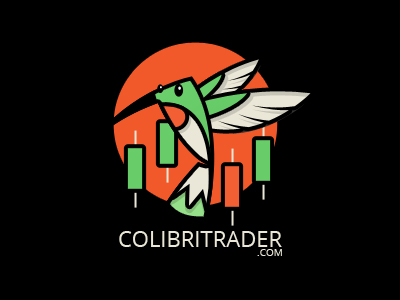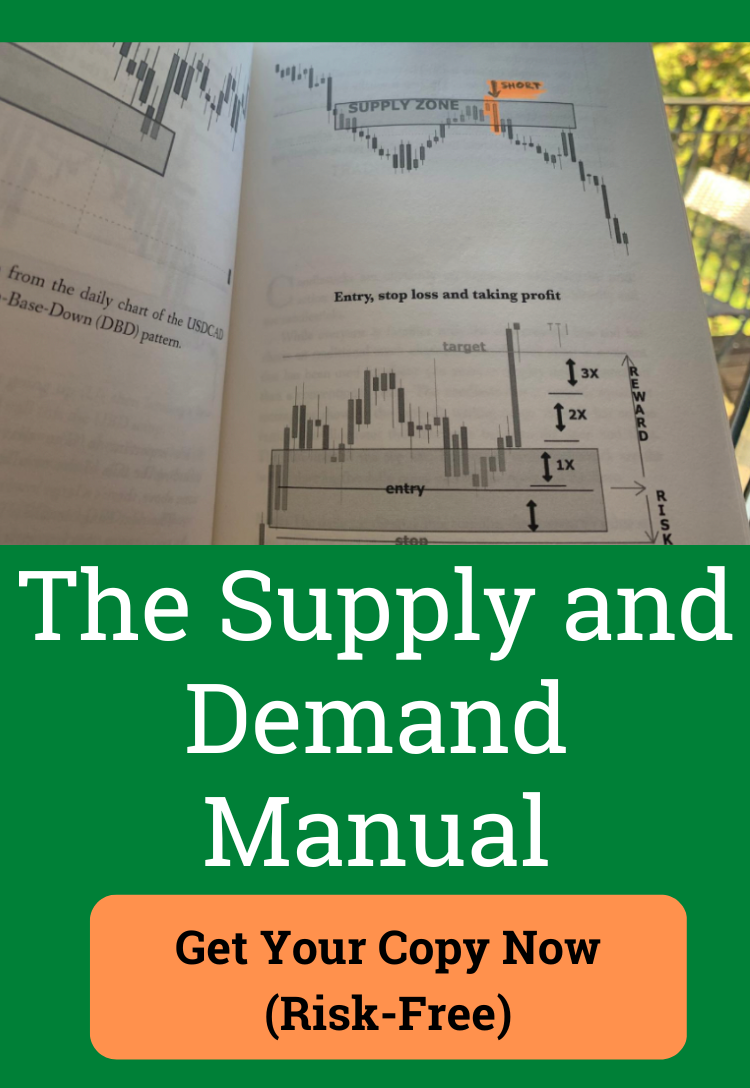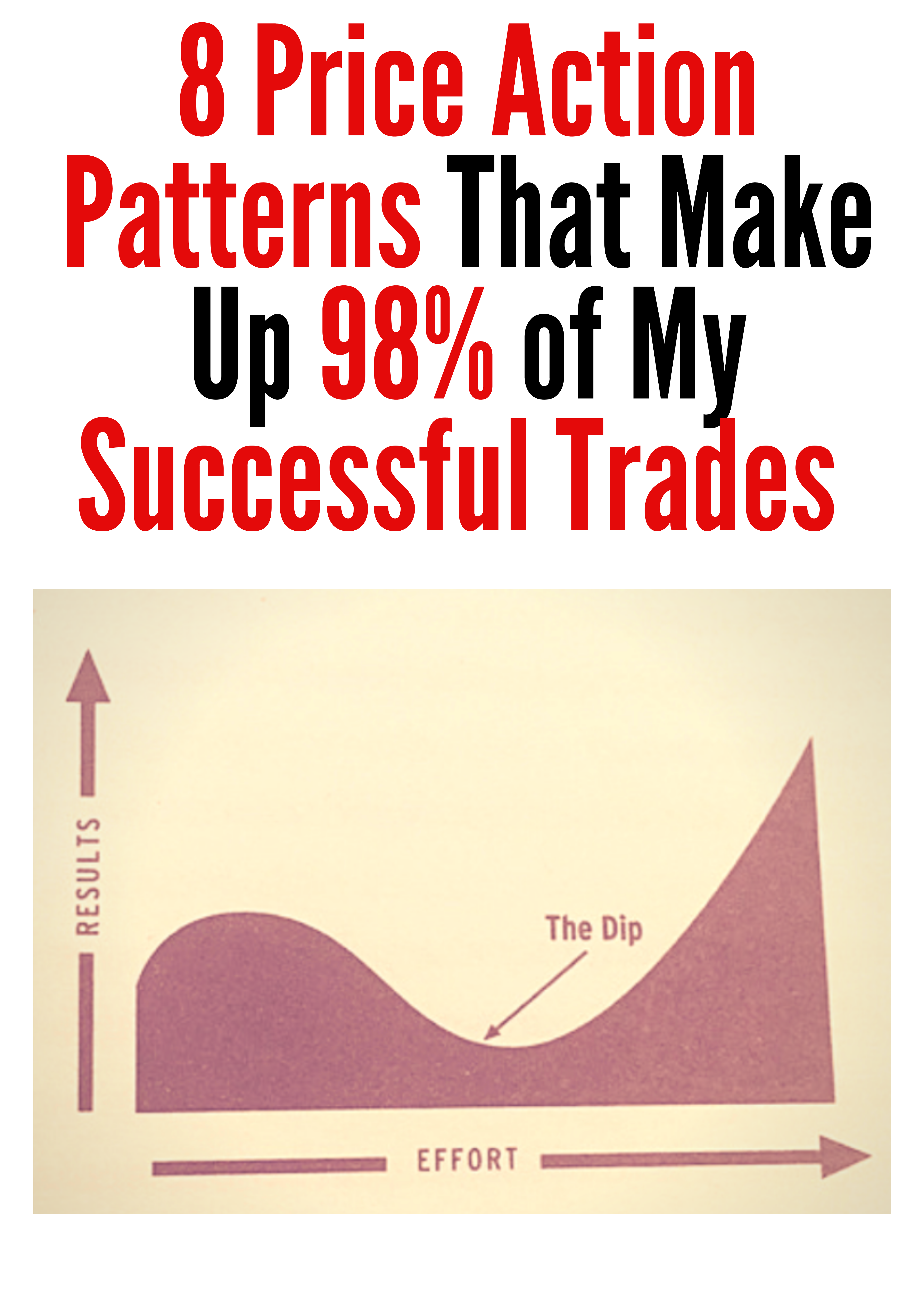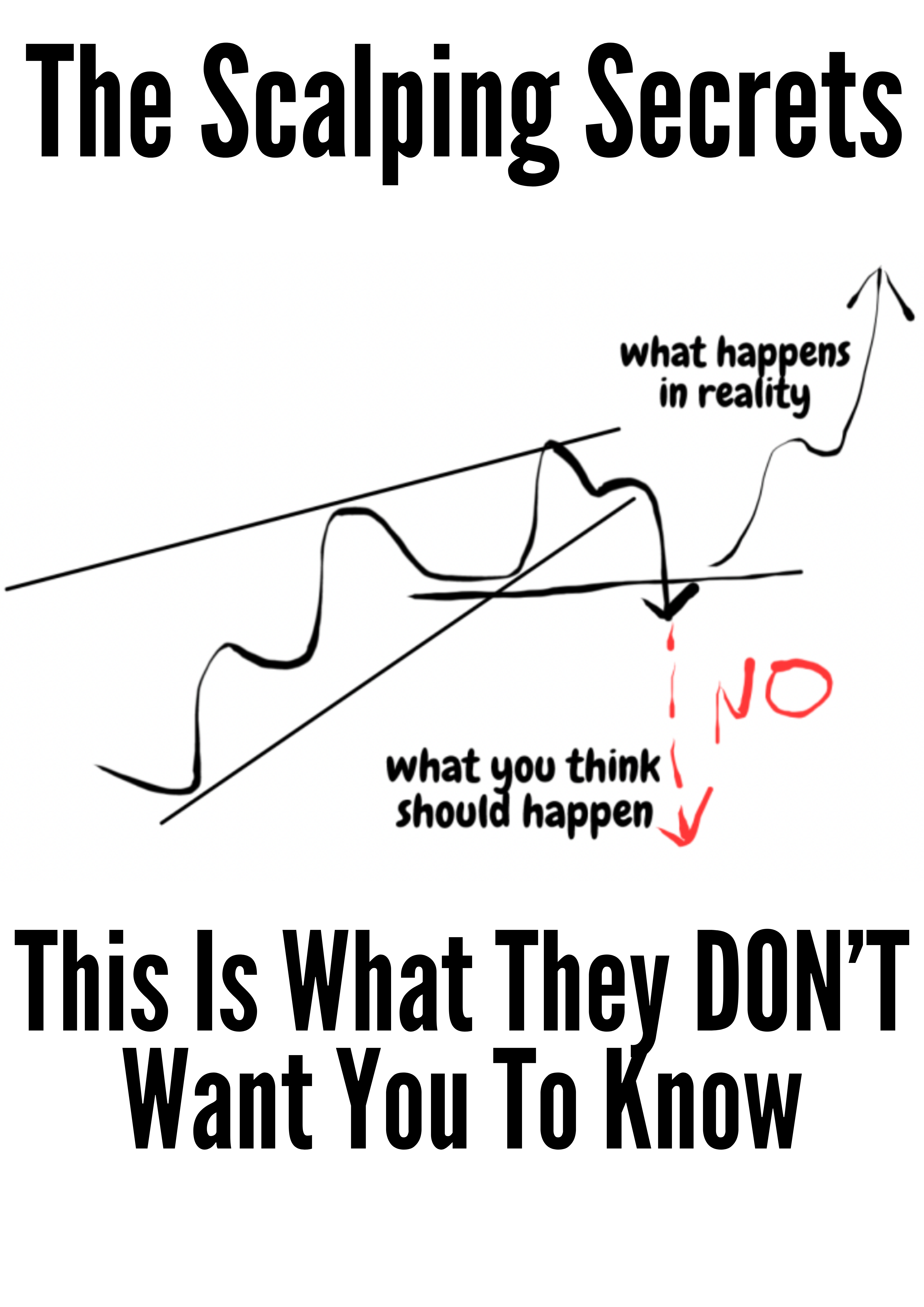7 Best Online Trading Platforms for 2025: A Deep Dive
The search for the best online trading platforms can feel overwhelming. With dozens of options, each promising low fees and powerful tools, how do you find the one that truly aligns with your trading style and financial goals? A platform is more than just a tool; it's your partner in navigating the markets. The right choice can streamline your workflow and provide a significant edge, while the wrong one can lead to missed opportunities and unnecessary costs.
This guide cuts through the noise. We provide a detailed, side-by-side comparison of the top 7 trading platforms for 2025, moving beyond marketing claims to deliver actionable insights. We'll examine the critical details that matter most to active traders and long-term investors alike, from nuanced commission structures and order execution quality to the user-friendliness of their charting software and mobile apps.
Our comprehensive roundup is designed to help you make an informed decision and build a solid foundation for your trading journey. We will dive deep into the specific features, pros, and cons of leading brokers like Fidelity, Charles Schwab, E*TRADE, Interactive Brokers (IBKR), Robinhood, TradeStation, and tastytrade. Each review includes screenshots to give you a feel for the user interface and direct links so you can explore further. Whether you're a novice investor or an experienced trader refining your strategy, this breakdown will help you identify the best online trading platform to support your ambitions.
1. Fidelity Investments: The All-Rounder for Value and Education
Fidelity has earned its place among the best online trading platforms by offering a remarkably comprehensive experience that caters to nearly every type of investor. It’s an ideal starting point for beginners yet possesses the advanced tools required by seasoned traders, making it a platform that can grow with you. The firm’s core philosophy revolves around delivering immense value through low costs and superior educational resources.
What truly sets Fidelity apart is its commitment to eliminating financial barriers for new investors. With no account minimums and $0 commissions on U.S. stock and ETF trades, anyone can start building a portfolio without significant upfront capital. This accessibility is a game-changer for those just learning how to start trading stocks. For more detailed guidance on beginning your investment journey, you can learn more about getting started with stocks.
Key Features and User Experience
Fidelity provides a seamless user experience across its web platform and mobile app, both of which are intuitive and easy to navigate. For more active traders, the Active Trader Pro desktop platform is a standout feature, offering fully customizable layouts, advanced charting tools, real-time data streaming, and sophisticated options-trading capabilities.
Here’s a breakdown of what to expect:
| Feature | Details |
|---|---|
| Commissions & Fees | $0 for U.S. stocks and ETFs. Options are $0.65 per contract. |
| Investment Selection | Extensive list of stocks, ETFs, and options. A massive collection of mutual funds, including several with a zero expense ratio (Fidelity ZERO funds). |
| Account Minimum | $0, making it highly accessible for new investors. |
| Research & Tools | Access to proprietary Fidelity research and insights from over 20 third-party providers like Morningstar and Zacks. |
Pros and Cons
While Fidelity excels as an all-rounder, it's important to weigh its strengths and weaknesses.
Pros:
- Exceptional Value: The combination of $0 commissions, zero-expense-ratio funds, and no account minimums is hard to beat.
- Top-Tier Education: The platform offers a vast library of articles, webinars, and courses designed to improve investor knowledge at all levels.
- Powerful Trading Platform: Active Trader Pro provides the advanced functionality that sophisticated traders demand, free of charge.
Cons:
- Options Pricing: The $0.65 per-contract fee for options is competitive but not the absolute lowest on the market, which may deter very high-volume options traders.
- Futures Trading: The platform lacks dedicated tools for advanced futures trading, making it less suitable for investors focused on that specific asset class.
For an in-depth, low-cost, and supportive environment, Fidelity is an outstanding choice.
Visit the website: https://www.fidelity.com
2. Charles Schwab: The Full-Service Broker with Unmatched Support
Charles Schwab stands as a titan in the brokerage industry, solidifying its place among the best online trading platforms by merging a full-service approach with competitive, modern pricing. It appeals to a broad spectrum of investors, from those who value in-person guidance at physical branches to sophisticated traders who require elite tools. The acquisition and integration of TD Ameritrade’s legendary thinkorswim platform has further cemented its position as a powerhouse.
What makes Charles Schwab a compelling choice is its blend of accessibility and depth. Like its top competitors, it offers $0 commissions on online U.S. stock and ETF trades, removing a key barrier for new investors. However, it goes further by providing an extensive product lineup that includes futures and forex, asset classes not available at every major broker. This makes it an excellent platform for investors looking to expand their strategies beyond traditional equities.
Key Features and User Experience
Charles Schwab offers a robust suite of platforms, including its standard website, mobile app, and the highly acclaimed thinkorswim platform for serious traders. Thinkorswim is renowned for its institutional-grade charting, strategy back-testing, and complex options analysis tools, making it a destination for active and derivatives traders. The standard Schwab platform remains clean, intuitive, and packed with high-quality research and planning resources.
Here’s a breakdown of what to expect:
| Feature | Details |
|---|---|
| Commissions & Fees | $0 for U.S. stocks and ETFs. Options are $0.65 per contract. Futures trading is available at $2.25 per contract, per side. |
| Investment Selection | A vast selection of stocks, ETFs, options, futures, and mutual funds. It also offers access to forex trading. |
| Account Minimum | $0, ensuring the platform is open to investors at all levels. |
| Research & Tools | Extensive proprietary research from the Schwab Center for Financial Research, alongside insights from Morningstar, Argus, and other third parties. |
Pros and Cons
While Schwab offers a comprehensive package, it’s important to consider its specific advantages and potential drawbacks.
Pros:
- Powerful Trading Platforms: The inclusion of thinkorswim provides an unparalleled toolset for advanced traders, free of charge.
- Strong Customer Support: Schwab is known for its excellent customer service, available 24/7, and its large network of physical branches for in-person support.
- Broad Investment Selection: Access to futures and forex trading gives investors more avenues to diversify and hedge their portfolios.
Cons:
- Options Pricing: While competitive, the $0.65 per-contract fee isn't the absolute lowest available, which could be a factor for high-volume options traders.
- Platform Transition: Some legacy TD Ameritrade users have noted that the integration and migration experience to the Schwab ecosystem can have a learning curve.
For investors who demand powerful tools, extensive investment choices, and industry-leading support, Charles Schwab is a top-tier option.
Visit the website: https://www.schwab.com
3. E*TRADE from Morgan Stanley: The Powerhouse with Institutional Backing
E*TRADE has long been a major player among the best online trading platforms, and its acquisition by Morgan Stanley has only solidified its position. It masterfully blends a user-friendly experience suitable for beginners with sophisticated tools designed for active traders. This dual-focus approach makes it an excellent choice for investors who want a platform that can accommodate their evolving needs, from simple stock purchases to complex options strategies.
What makes ETRADE stand out is its robust suite of platforms and the integration of premier institutional research from Morgan Stanley. This combination provides retail investors with access to insights and analysis typically reserved for high-net-worth clients. With competitive pricing and strong promotional offers for new accounts, ETRADE presents a compelling package for those seeking a feature-rich trading environment.
Key Features and User Experience
ETRADE offers two primary platforms: the standard web-based ETRADE platform, which is clean and intuitive for everyday investing, and the advanced Power E*TRADE platform. Power E*TRADE is a top-tier tool for serious traders, featuring advanced charting, technical analysis tools, risk analysis, and streamlined options trading workflows.
Here’s a breakdown of what to expect:
| Feature | Details |
|---|---|
| Commissions & Fees | $0 for U.S. stocks and ETFs. Options are $0.65 per contract, reduced to $0.50 for active traders (30+ trades per quarter). OTC trades are $6.95. |
| Investment Selection | A wide array of stocks, ETFs, options, mutual funds, and futures contracts. |
| Account Minimum | $0 for a standard brokerage account. |
| Research & Tools | Access to extensive proprietary research and commentary from Morgan Stanley, alongside third-party data and screeners. |
Pros and Cons
While E*TRADE provides a powerful and comprehensive experience, it's essential to consider its specific advantages and potential drawbacks.
Pros:
- Excellent Trading Platforms: Both the standard and Power E*TRADE platforms are well-designed, offering a great user experience for different skill levels.
- High-Quality Research: The integration of Morgan Stanley research provides a significant analytical edge for making informed investment decisions.
- Great for Options Traders: The Power E*TRADE platform and features like the "dime buyback" program (no contract fee to close short options priced at $0.10 or less) are highly appealing.
Cons:
- OTC Stock Fees: Unlike some competitors who offer free OTC trades, E*TRADE charges a commission ($6.95, or $4.95 for active traders), which can add up for penny stock traders.
- Standard Options Pricing: The base $0.65 per-contract fee for options is standard but not the absolute cheapest available, which may be a factor for very high-frequency traders.
For investors who value top-tier tools, institutional research, and a seamless user experience, E*TRADE is a formidable contender.
Visit the website: https://us.etrade.com
4. Interactive Brokers (IBKR): The Professional's Choice for Global Trading
Interactive Brokers (IBKR) has cemented its reputation as one of the best online trading platforms for sophisticated, active, and global traders. It is a powerhouse, offering institutional-grade tools, unparalleled market access, and some of the lowest costs in the industry. While it may seem daunting to newcomers, its robust infrastructure provides a significant advantage for those who require precision, speed, and worldwide reach.
What truly distinguishes IBKR is its commitment to providing professional-level trading at an accessible price point. The platform offers two main pricing plans: IBKR Lite for casual investors (offering $0 commission on U.S. stocks and ETFs) and IBKR Pro for active traders, featuring advanced order routing technology and ultra-low, tiered commissions. This dual-pronged approach allows it to serve a wide spectrum of investors without compromising on its core strengths.
Key Features and User Experience
IBKR’s flagship desktop platform, Trader Workstation (TWS), is the centerpiece of its offering. It is a highly sophisticated and customizable terminal packed with advanced charting, algorithmic trading options, and real-time risk management tools. For less complex needs, the web-based Client Portal and IBKR Mobile app offer a more streamlined, yet still powerful, experience. A great way to maximize the platform's advanced features is by meticulously tracking your performance, and you can learn how a trading journal can enhance your strategy.
Here’s a breakdown of what to expect:
| Feature | Details |
|---|---|
| Commissions & Fees | IBKR Lite: $0 for U.S. stocks/ETFs. IBKR Pro: Tiered pricing from $0.0005/share. Options from $0.15 to $0.65 per contract. |
| Investment Selection | Unmatched global access to stocks, options, futures, forex, bonds, and funds across 150 markets in 34 countries. |
| Account Minimum | $0, removing a key barrier for traders wanting to access professional tools without a large initial investment. |
| Research & Tools | Advanced order routing (SmartRouting), portfolio analysis tools, and access to dozens of third-party research providers. |
Pros and Cons
While IBKR is a top-tier choice for serious traders, its professional focus comes with certain trade-offs.
Pros:
- Superior Low Costs: IBKR Pro offers some of the lowest margin rates and commission structures for high-volume traders.
- Extensive Global Access: The ability to trade a vast range of products across international markets from a single account is unparalleled.
- Advanced Trading Technology: Trader Workstation and SmartRouting provide exceptional execution speed and price improvement for serious traders.
Cons:
- Steep Learning Curve: The TWS platform is incredibly powerful but can be overwhelming and complex for beginners.
- Complicated Fee Structure: The tiered pricing models and various platform fees can be difficult to understand compared to simpler, flat-rate brokers.
For active, experienced, and international traders seeking the best in execution and cost, Interactive Brokers is in a class of its own.
Visit the website: https://www.interactivebrokers.com
5. Robinhood: The Pioneer of Commission-Free Simplicity
Robinhood fundamentally changed the brokerage landscape by popularizing commission-free trading, making it one of the best online trading platforms for beginners. Its mission is to "democratize finance for all," and it achieves this through an incredibly intuitive app and desktop platform that eliminates common financial barriers. The platform is designed for speed and simplicity, allowing users to start trading stocks, ETFs, and options within minutes of signing up.
The core appeal of Robinhood lies in its straightforward, mobile-first design, which removes the complexity often associated with traditional brokerages. This focus on accessibility makes it an excellent entry point for new investors who might otherwise feel intimidated. For those looking to understand the fundamentals of the market, this simplified approach can be a significant advantage. You can learn more about trading for beginners to build a solid foundation.
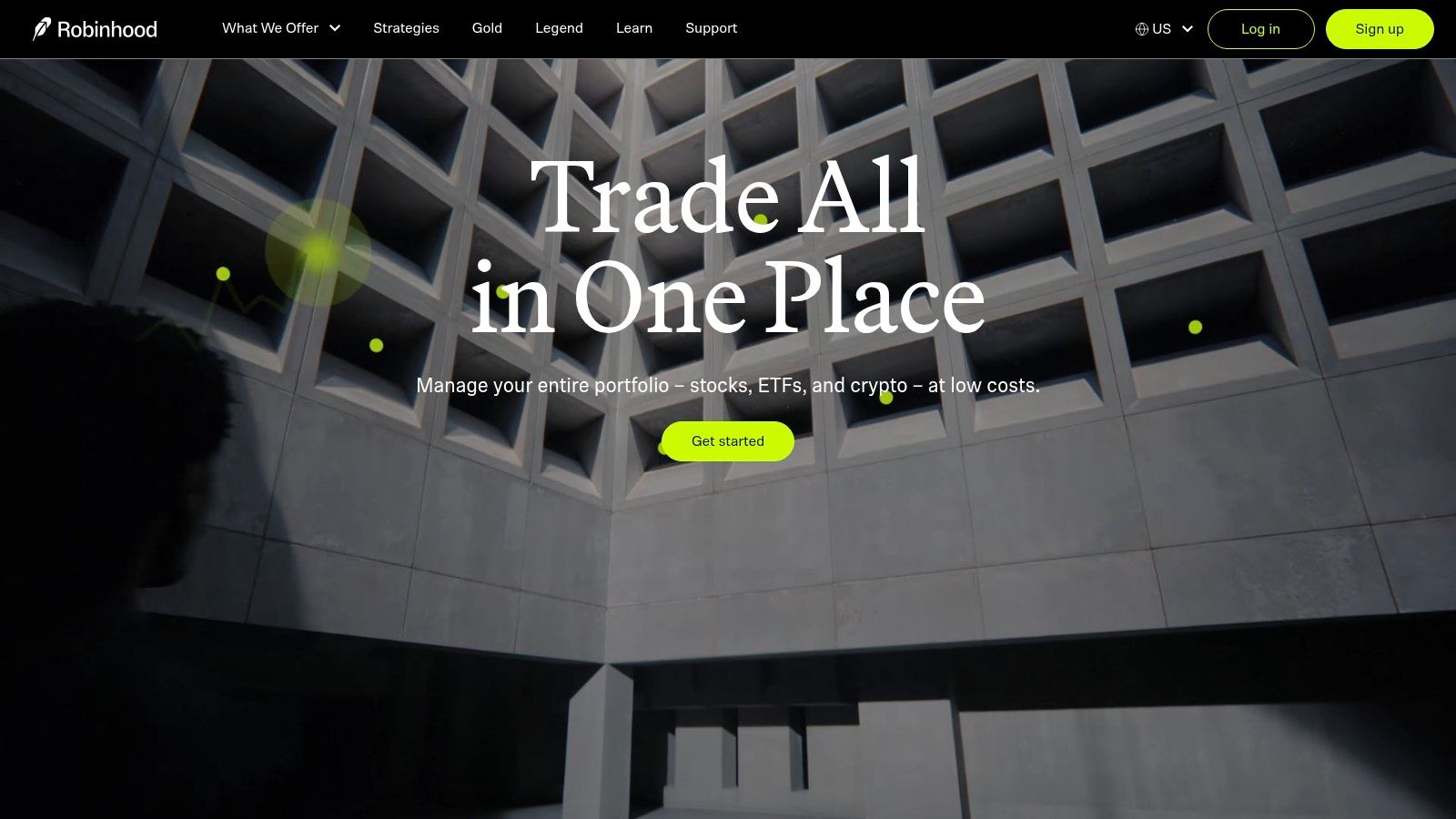
Key Features and User Experience
Robinhood’s interface is famously clean and easy to navigate, prioritizing essential functions over a vast array of complex tools. The experience is consistent across both its mobile app and the more recently enhanced 'Legend' desktop platform, which adds features like advanced charting and customizable layouts. The platform has also expanded its offerings to include index options and futures, broadening its appeal.
Here’s a breakdown of what to expect:
| Feature | Details |
|---|---|
| Commissions & Fees | $0 for U.S. stocks and ETFs. Stock/ETF options are $0 base and $0 per contract. Index options and futures have detailed, transparent fee schedules. |
| Investment Selection | Stocks, ETFs, options (including index options), and select cryptocurrencies. |
| Account Minimum | $0, making it extremely easy for anyone to get started. |
| Research & Tools | Basic charting tools, news feeds, and analyst ratings. Robinhood Gold subscribers get access to Morningstar research and Level II market data. |
Pros and Cons
While Robinhood excels at accessibility, its streamlined nature comes with certain trade-offs.
Pros:
- Extremely Low Entry Barriers: The combination of a $0 account minimum and a famously simple onboarding process makes it ideal for new investors.
- Commission-Free Options: Offering $0 base and $0 per-contract fees on stock and ETF options is a significant advantage for cost-conscious traders.
- Transparent Fee Disclosures: The platform provides clear, itemized schedules for its index options and futures fees, including pass-through regulatory costs.
Cons:
- Limited Advanced Tools: The platform lacks the sophisticated analytics, research, and product depth found at professional-grade brokerages.
- Execution Quality Concerns: Robinhood's payment for order flow model has raised questions about execution quality compared to rivals, particularly for less-liquid stocks.
For new investors prioritizing ease of use and low costs, Robinhood remains a powerful and compelling choice.
Visit the website: https://robinhood.com
6. TradeStation: The Powerhouse for Active and Technical Traders
TradeStation has carved out a niche as one of the best online trading platforms for serious, active, and technically-minded traders. It delivers a professional-grade experience, focusing on high-powered analytics, automated strategy testing, and lightning-fast execution. While it supports casual investors, its true strength lies in the sophisticated desktop software and advanced tools designed for those who live and breathe the markets.
The platform's core appeal is its commitment to providing institutional-quality tools directly to retail traders. Features like RadarScreen for real-time market scanning and EasyLanguage, a proprietary coding language, allow users to build, test, and automate their own custom trading strategies. This level of customization and analytical depth is what differentiates TradeStation from more mainstream brokers.
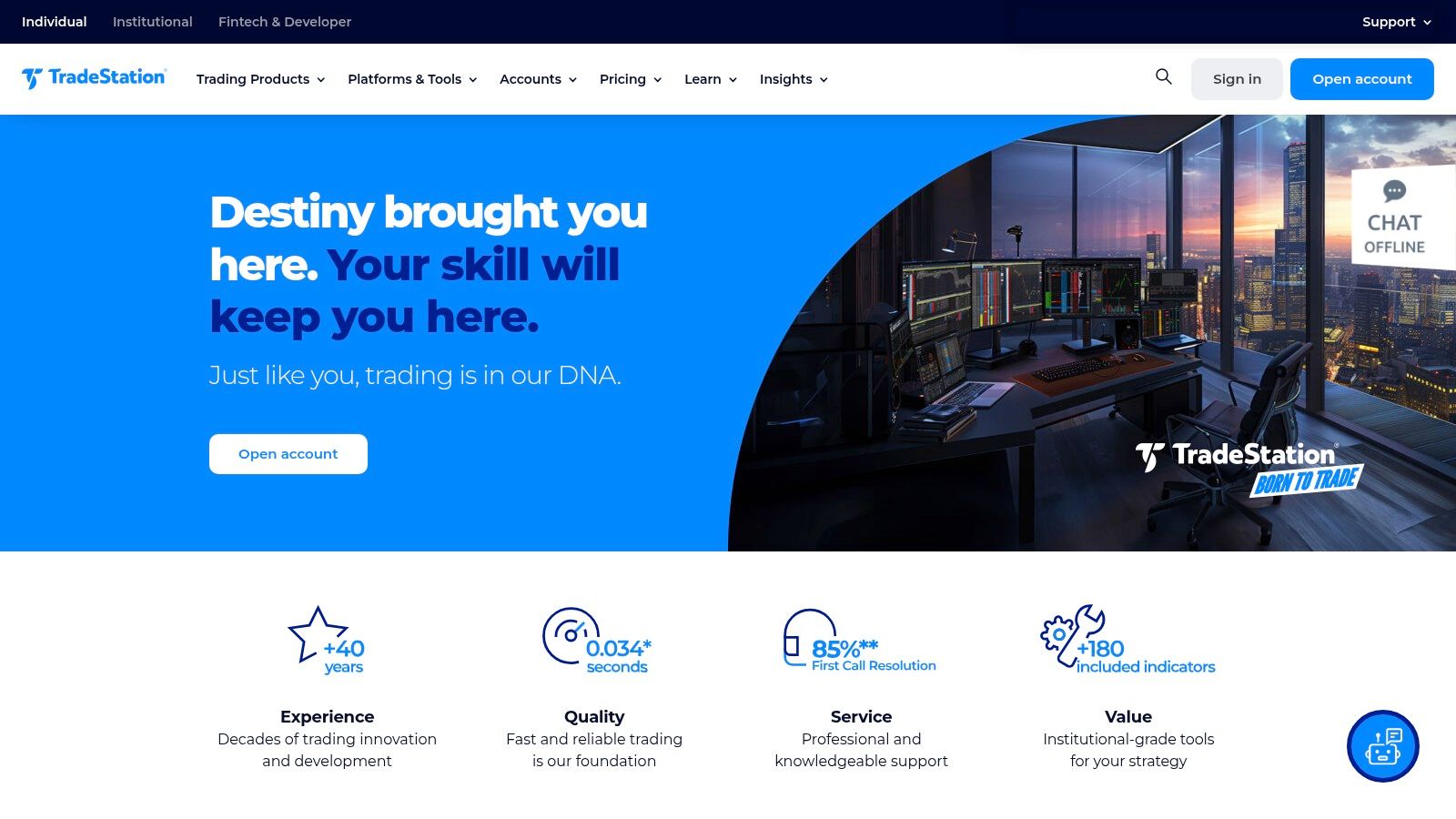
Key Features and User Experience
TradeStation’s ecosystem is built around its flagship desktop platform, which is renowned for its speed, stability, and advanced charting capabilities. While a web-based and mobile version exist for on-the-go access, the desktop client remains the heart of the offering, providing a fully customizable trading environment packed with technical indicators and drawing tools.
Here’s a breakdown of what to expect:
| Feature | Details |
|---|---|
| Commissions & Fees | $0 for U.S. stocks and ETFs on the TS Select plan. Options are competitively priced at $0 base + $0.60 per contract. |
| Investment Selection | Comprehensive access to stocks, ETFs, options, futures, micro futures, and options on futures. |
| Account Minimum | $0 for TS Go accounts; $2,000 for the more feature-rich TS Select account. |
| Research & Tools | Exceptional desktop platform with advanced charting, RadarScreen market scanner, EasyLanguage automation, and robust backtesting tools. |
Pros and Cons
TradeStation is an incredibly powerful platform, but its professional focus comes with certain trade-offs.
Pros:
- Professional-Grade Tools: The desktop software provides unparalleled analytical depth, real-time scanning, and automation capabilities without a platform fee on the core plan.
- Competitive Pricing: The combination of $0 stock commissions and low-cost options contracts makes it an attractive choice for high-volume traders.
- Extensive Asset Support: It is one of the few platforms that excels in providing access to stocks, options, and futures all under one roof.
Cons:
- Pricing Complexity: Traders must pay close attention to the fine print, as extra fees can apply for index options, direct routing, and other services.
- Steep Learning Curve: The desktop platform, while powerful, can be overwhelming for beginners or casual investors who don't need its full suite of features.
For dedicated traders seeking advanced analytics and automation, TradeStation is a formidable contender.
Visit the website: https://www.tradestation.com
7. tastytrade: The Specialist for Options Enthusiasts
tastytrade has carved out a unique niche among the best online trading platforms by building a brokerage specifically for options traders, by options traders. It is an ideal ecosystem for investors who want to move beyond simple stock and ETF trades and delve into the complexities of options strategies. The platform’s core philosophy is rooted in a highly transparent, trader-friendly pricing model and an unparalleled commitment to derivatives education.
What makes tastytrade truly stand out is its specialized focus and vibrant community. While other brokers treat options as an add-on, tastytrade places them at the center of its universe, providing tools, content, and a pricing structure designed to benefit active options traders. This focus creates a powerful environment for learning and executing sophisticated strategies on equities, indices, and futures.
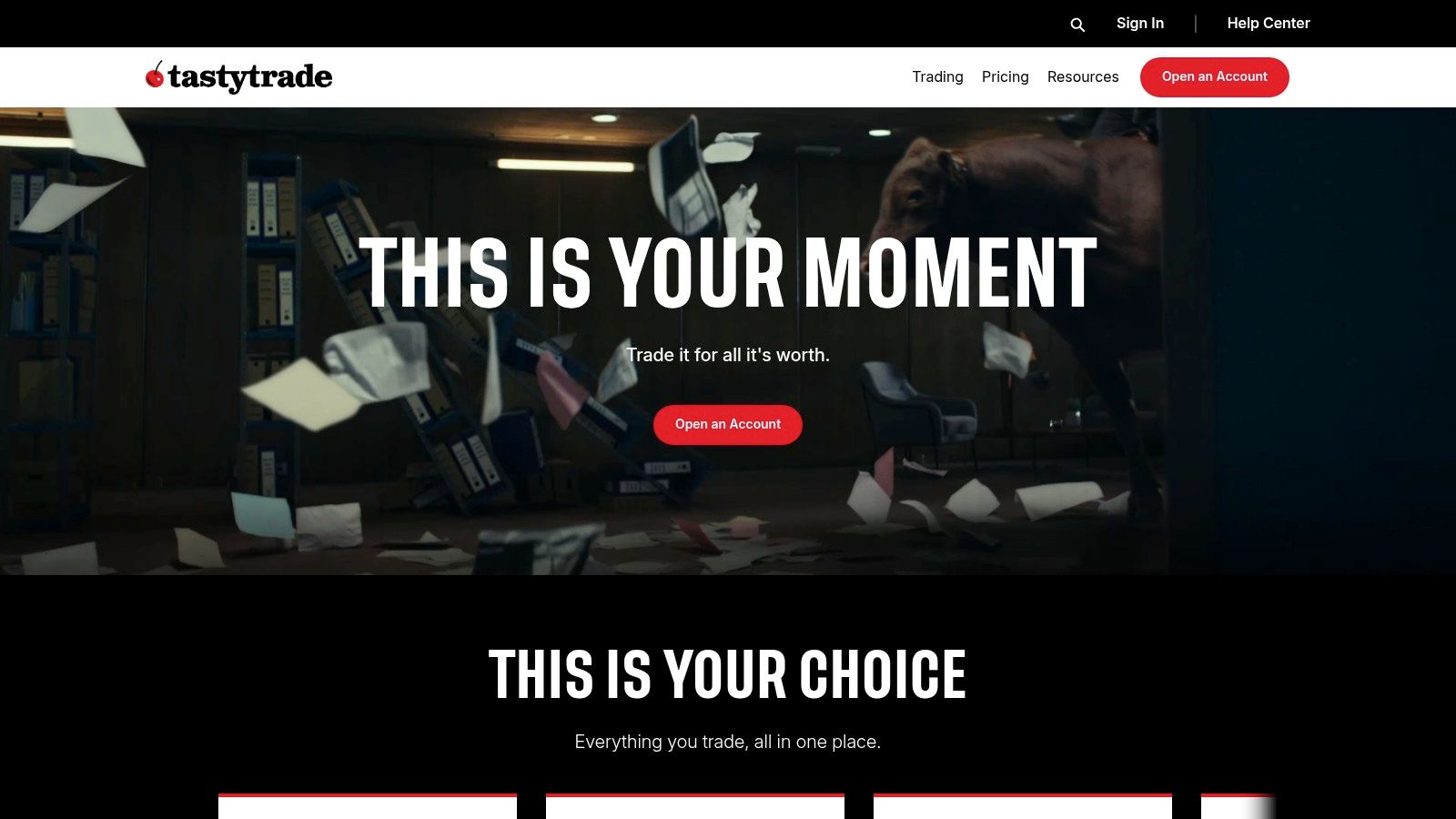
Key Features and User Experience
The tastytrade platform is built for speed and efficiency, offering a robust interface that displays complex options chains, probability of profit, and potential return on capital with clarity. Its design prioritizes quick trade execution and risk analysis, which are critical for derivatives traders. The platform integrates seamlessly with its extensive media network, tastylive, providing real-time analysis and actionable trade ideas directly within the interface.
Here’s a breakdown of what to expect:
| Feature | Details |
|---|---|
| Commissions & Fees | $0 for stocks and ETFs. Equity options are $1.00 to open, but free to close, with a $10 cap per leg. Futures are competitively priced. |
| Investment Selection | Primarily focused on options, futures, and options on futures. Stocks and ETFs are also available. |
| Account Minimum | $0 to open a standard cash or margin account. |
| Research & Tools | The platform is a tool in itself, with built-in analytics for volatility and probability. It is supported by a massive library of educational content and live shows. |
Pros and Cons
While tastytrade is a top choice for its target audience, it's important to understand its specialized nature.
Pros:
- Trader-Centric Pricing: Capped commissions on equity options ($10 per leg) and free-to-close trades are highly beneficial for high-volume and multi-leg strategy traders.
- Unmatched Options Education: The integrated tastylive network provides an endless stream of free, high-quality content, from beginner tutorials to advanced strategy discussions.
- Powerful and Focused Platform: The tools are designed from the ground up to analyze and trade options and futures efficiently.
Cons:
- Higher Cost for Small Trades: The $1.00 per-contract fee to open is more expensive than some competitors for traders opening just one or two contracts at a time.
- Limited Traditional Offerings: The platform places less emphasis on traditional investments like mutual funds and bonds, making it less suitable as a one-stop-shop for retirement planning.
For traders serious about mastering options and futures, tastytrade offers an unmatched, specialized experience.
Visit the website: https://tastytrade.com
Top 7 Online Trading Platforms Comparison
| Broker | Implementation Complexity 🔄 | Resource Requirements 💡 | Expected Outcomes 📊 | Ideal Use Cases 💡 | Key Advantages ⭐⚡ |
|---|---|---|---|---|---|
| Fidelity Investments | Moderate – user-friendly tools with advanced platform options | Extensive research and education resources | Strong order execution and broad product access | Beginners to active traders needing full service | $0 commissions on stocks/ETFs, robust research ⭐, no account minimums |
| Charles Schwab | Moderate – integrated thinkorswim may have minor learning curve | Wide-ranging educational and support tools | Competitive pricing with strong nationwide support | All-around investors valuing support and product breadth | $0 stock/ETF commissions, large branch network, futures trading |
| E*TRADE from Morgan Stanley | Moderate – intuitive platform, some complexity in options pricing | Good research and promotional resources | User-friendly trading with competitive pricing | Intermediate traders seeking flexible options pricing | Dime buyback options feature, strong platform usability |
| Interactive Brokers (IBKR) | High – advanced tools with steep learning curve | Sophisticated platforms, global market access | Lowest all-in costs, strong order routing | Active, international, and professional traders | Low trading costs with volume discounts, broad global access ⭐ |
| Robinhood | Low – simple platform focused on ease of use | Limited resources but clear fee disclosures | Fast onboarding, commission-free trades | New investors and casual traders seeking simplicity | $0 commissions on stocks/options, transparent fees, beginner-friendly ⚡ |
| TradeStation | High – advanced charting, automation, and complex pricing | Powerful desktop tools, strong analytics | Professional-grade tools for active traders | Experienced traders wanting automation and strategy testing | Robust automation, competitive options fees, no core platform fee |
| tastytrade | Moderate – options-centric with education focus | Extensive educational media and strategy content | Transparent, capped options pricing | Options-focused investors and educators | Trader-friendly capped fees, free close on equity options, strong education |
Making Your Final Decision: From Platform to Profitability
Navigating the landscape of the best online trading platforms can feel overwhelming, but this guide has laid out the distinct strengths of the industry's top contenders. We've dissected everything from Fidelity's robust research tools and investor education to Interactive Brokers' unparalleled global market access and professional-grade platform. You've seen how Charles Schwab excels in customer service and all-around excellence, while E*TRADE offers a powerful, user-friendly experience for a broad range of traders.
For those prioritizing simplicity and mobile-first design, Robinhood remains a popular entry point, whereas TradeStation caters to the serious, data-driven trader with its advanced charting and backtesting capabilities. Finally, tastytrade has carved out a niche as the go-to platform for derivatives and options traders who demand specialized tools and a supportive community. Your journey begins with aligning these platform features with your personal trading ambitions.
How to Choose Your Ideal Trading Platform
Making the right choice isn't about finding a single "best" platform; it's about finding the best fit for you. The perfect platform for a long-term, buy-and-hold investor will be vastly different from what an active day trader or a sophisticated options strategist needs.
To crystallize your decision, consider these key factors:
- Your Trading Style: Are you a passive investor or an active trader? If you plan to make frequent trades, low commission costs and fast execution speeds, like those offered by Interactive Brokers or TradeStation, become critical. Long-term investors may prioritize research and account types, making Fidelity or Schwab more appealing.
- Preferred Assets: What do you want to trade? If your focus is purely on stocks and ETFs, most platforms will suffice. However, if you're interested in options, futures, or international stocks, you need a specialized platform. For example, tastytrade is purpose-built for options, while IBKR provides the broadest access to global markets.
- Technical Skill and Experience Level: A novice trader could be overwhelmed by the complexity of TradeStation's platform. Conversely, an experienced trader might find Robinhood's feature set too restrictive. Be honest about your current skill level. Platforms like E*TRADE and Fidelity offer a great balance, providing powerful tools within an intuitive interface that can grow with you.
Key Insight: The best platform is an extension of your trading strategy. It should remove friction from your process, not add to it. Choose a tool that complements your workflow and empowers you to execute your plan with confidence and efficiency.
Beyond the Platform: The Cornerstone of Success
Selecting from the best online trading platforms is a crucial logistical step, but it is not the final destination. The most sophisticated software in the world cannot guarantee profitability. A powerful platform in the hands of an undisciplined trader is merely a faster way to lose money. True, sustainable success in the markets is built on a foundation of knowledge and a proven, repeatable strategy.
The platform is the vehicle, but your trading methodology is the engine and the navigation system. Without a solid understanding of market dynamics, risk management, and price action, even the most feature-rich platform is rendered ineffective. This is why investing in your education is the single most important trade you will ever make. Learning a timeless strategy, like those based on price action, ensures your skills are transferable and effective no matter which broker you ultimately choose or how market conditions evolve.
Your platform provides access to the market, but your strategy dictates how you navigate it. By prioritizing your education, you transform your chosen platform from a simple order-entry system into a precision instrument for executing a well-defined and profitable trading plan. This is the ultimate key to shifting from simply participating in the markets to consistently profiting from them.
Ready to build a trading strategy that works on any platform? Colibri Trader focuses on teaching timeless price action principles that empower you to trade with confidence and clarity. Master a proven methodology and turn your chosen trading platform into a true engine for profitability by visiting Colibri Trader.
